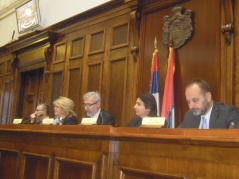National Assembly of the Republic of Serbia / Activities / Activity details

10 December 2012 Participants of the public hearing on the International Human Rights Day
Monday, 10 December 2012
Public Hearing Held to Mark International Human Rights Day
The National Assembly’s Committee on Human and Minority Rights and Gender Equality held its second public hearing, with the topic “Execution of Judgments of the European Court of Human Rights in the case of Serbia”, on 10 December 2012, to mark the International Human Rights Day. The public hearing was attended by the MPs, representatives of numerous state, international and non-governmental organisations, as well as national minority councils.
Opening the public hearing, the Chairman of the Committee on Human and Minority Rights and Gender Equality, Meho Omerovic, said that the gathering was organised to mark the International Human Rights Day and draw attention to how important it is to respect the human rights and dignity of every individual in Serbia. Stressing that Serbia had made the effort to improve the situation in the field of human rights protection, Omerovic pointed out the existing systemic problems as regards the execution of the judgments of the European Court.
The representative of the Department for the execution of judgments of the European Court of Human Rights at the Committee of Ministers of the Council of Europe, Katarina Nedeljkovic, presented the obligations of the member states as regards the execution of the judgments of the European Court of Human Rights and the Council of Europe’s supervisory role. She stressed that the judgments of the European Court are binding for all state authorities, adding that the Committee of Ministers exercises two types of supervision – standard and enhanced. She also said that all the information on the execution of judgments is available to the public on the Department’s website.
The Agent of the Republic of Serbia before the European Court of Human Rights, Slavoljub Caric, briefed the participants of the public hearing on the challenges of the judgment execution procedure in the Republic of Serbia. He said that Serbia ranks sixth by the number of cases brought against it before the European Court in Strasbourg. Serbia has 72 judgments before the court so far, eight of which it had won.
Sasa Jankovic, the Ombudsman, said that there is no reason to be satisfied with the state of human rights in Serbia, especially social and economic rights. He believes that weak institutions with strong individuals, supremacy of the political will over the rule of law, bureaucracy and formalism are the biggest obstacles to a more complete implementation of human rights and the rule of law in the country.
Nata Mesarovic, President of the Supreme Court of Cassation, stressed that only a strengthening of the domestic institutions may lead to a decrease in the number of complaints before the European Court in Strasbourg. She opined that domestic courts pay more and more attention to the practice of the European Court, adding however, that the state should provide education and training for the judges.
Concluding the public hearing, the Chairman of the Committee on Human and Minority Rights and Gender Equality, Meho Omerovic, proposed conclusions stating that Serbia, as a member of the Council of Europe, has made visible progress in the sphere of protecting human rights and liberties. However, the practice of the European Court of Human Rights in Serbia’s case can prove a powerful incentive for all the state institutions to improve the sphere in the upcoming period.
To that end, it is necessary to secure the following:
- the existence of suitable and efficient mechanisms to systemically check the compliance of bills with the European Convention on Human Rights;
- coordination and cooperation of national institutions involved in the execution of judgments of the European Court of Human Rights;
- to regularly inform the National Assembly of the Republic of Serbia and competent assembly committees about the execution of judgments of the European Court of Human Rights;
- to promote dialogue between competent institutions for the execution of judgments and highest judiciary bodies, as well as include non-governmental organisations, the Ombudsman and other institutions in the sphere of human rights in the process of execution of judgments of the European Court of Human Rights;
- to strengthen the capacity of judiciary bodies.




